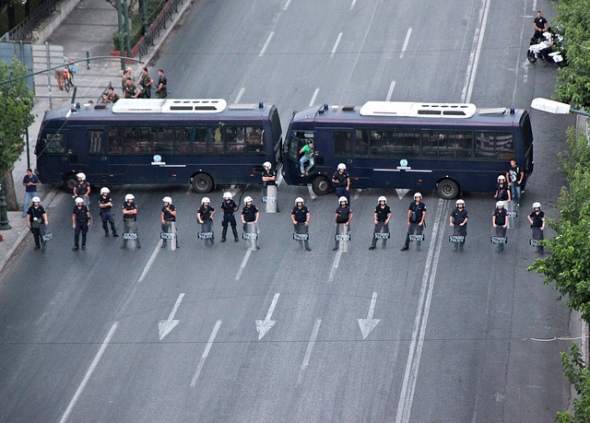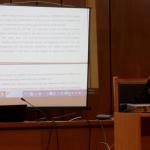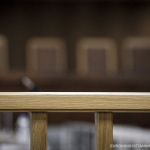The country’s neo-Nazi party is to be put on trial this week. Niki Seth-Smith analyses the implications.
With 69 members and alleged supporters in the dock, the trial is expected to last up to a year and a half. It will not only be pivotal for Greece, but a potential landmark in the struggle against the resurgent far right across Europe.
An open secret
Golden Dawn officially denies both its criminal activity and its , yet it has never made a secret of either.
Sporting their black uniforms and Swastika-like logo, party members have been regulars on Greek television for years, openly calling immigrants ‘sub-human’ and declaring sympathies with Hitler, while the leader, Nikos Michaloliakos, has defended their use of the Nazi salute.
While many of their followers might be better described as hard-right nationalists, it can’t be avoided that over 6 per cent of the Greek electorate knowingly voted for a neo-Nazi party in January this year, in the same election that brought the leftwing Syriza party to power.
In Greece, there is no legal framework against promoting Nazism, as there is in Germany. Thus, Golden Dawn is not being prosecuted for its ideological beliefs, but the criminal acts stemming from them. The party machine has been accused of funding itself and bolstering its influence through mafia-style activities, including trafficking, blackmail and fraud.
Party members have been implicated in hundreds of attacks on immigrants and multiple death cases, yet it has never been proven that orders came down the chain of command.
Those living in fear of Golden Dawn have had to wait for the gruesome murder of a native Greek, Pavlos Fyssas, a leftwing rapper, for the state to intervene. His unprovoked and fatal stabbing on the streets of the port town of Piraeus, in September 2013, caused national outrage and pushed the government to act, arresting the alleged murderer and raiding party offices.
Now, the job of the prosecution is to prove that these crimes were not committed at the hands of rogue elements – the party thug squad – and that they run at the very heart of the operation.
State of impunity
While the financial crisis has allowed Golden Dawn to gain mass popularity over the last half decade, the party has existed since the 1980s. It is not simply a product of austerity, as the roots of its ideology can be traced back to the legacy of the Nazi occupation and the military dictatorship that ruled Greece from 1967 to 1974.
Many in Greece see the party as extending a well-established dynamic, wherein the state makes use of far-right extremists in order to further its agenda.
Research by the Rosa Luxembourg Foundation sets out extensive evidence of the infiltration of the neo-Nazi party into the Greek deep state.
Dimitris Christopoulos, Vice-President of the International Federation for Human Rights and member of the Golden Dawn Watch observatory, says that the same ‘strategy of tension’ employed under the military junta of the 1970s was then used by the former New Democracy government, when dealing with the Golden Dawn.
This dynamic held out until the Fyssas murder, when ‘even the political rightwing felt unsettled because they saw that, even as Golden Dawn was claiming to give hegemonic expression to the country’s traditional circles of extreme conservatism, it now posed a real threat to social peace’.
The very fabric of power in Greek society is also, in a sense, on trial. Thanassis Kampagiannis, the lawyer representing Egyptian fishers allegedly assaulted by Golden Dawn, is well aware of the enormous task in hand.
‘The collaboration between the police, state and judiciary, and Golden Dawn criminal acts’ created a ‘state of impunity’, he says. While stressing that these are criminal cases, he warns against ‘efforts to depoliticize the trials’, stressing that the party did not act alone.
Global attention
The trials began on 20 April, only to be adjourned on a technical point, amid attacks on witnesses. On 7 May they resumed and were adjourned again until 11 May, due to a conflict over the court venue.
There are questions over the suitability of the current venue, a high-security prison in southwest Athens, as the neighbourhood is politically sensitive and home to many schools facing serious disruption.
Still, the venue is also symbolic, as most Greeks, particularly anti-fascist groups, want better access to a trial that is central to the country’s future.
Since the prosecution, Golden Dawn’s support has flat-lined and it is toning down its rhetoric in parliament, ‘trying to be seen as a serious, respectable party’, according to Syriza MP Vassiliki Katrivanou.
The government has made good use of the ‘them or us’ threat, implying that were Syriza to fall, the Golden Dawn may be next.
As Varoufakis put it in a speech to the German Finance Minister: ‘No-one understands better than the people of this land how a severely depressed economy, combined with a ritual national humiliation and unending hopelessness can hatch the serpent’s egg within its society.’
It’s unclear whether the party’s popularity will recover, or whether or not Syriza will lose power. Equally, this prosecution is insufficient to deal with a force that can easily assume another legal form.
What’s certain is that if Golden Dawn is not brought to justice, Greece will be sending a green light to its own far right and to groups across Europe.
Parties such as Jobbik, whose anti-Roma rallies are accused of whipping up violent crime in Hungary, or the Dutch PVV, whose leader Geert Wilders has been tried and acquitted of hate speech, will be watching the criminal proceedings with particular interest.
Golden Dawn is at the forefront of a trend that has been growing in Europe since the 1990s. This trial is an opportunity for Greece, and thus Europe, to draw a red line.
Source: NEW INTERNATIONALIST magazine









